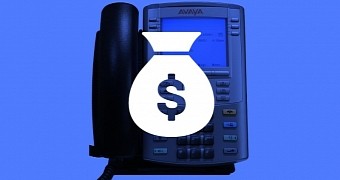Muhammad Sohail Qasmani, 47, from Pakistan, pleaded guilty to charges of conspiracy to commit wire fraud, as part of an international crime gang that hacked telephone servers and defrauded companies of well over $19.6 million / €17.4 million.
PBX (Private Branch Exchange) systems are private telephone networks used within a company, which connect to external telephony providers. Just as routers manage IP addresses inside a LAN, PBX systems manage telephone numbers inside a closed enterprise phone network.
Hackers hijacked unused telephone numbers
Starting 2008, a criminal group operating from Pakistan hacked PBX systems belonging to various companies across the globe. Hackers were illegally accessing the devices and scanning for unused numbers.
They would then hijack these unused telephone extensions and initiate calls to premium numbers for services such as adult entertainment, private chat lines, and psychic hotlines.
All of these premium numbers were registered and under the control of Noor Aziz, 53, of Karachi, Pakistan, who would benefit from the revenue provided by these hijacked phone calls. The companies that had their phone numbers hijacked would eventually have to foot the bill for all the illegal calls.
Aziz worked with Qasmani, who set up a company in Bangkok through which Aziz laundered money and paid the people that hacked the PBX systems and the ones that constantly dialed each number (called dialers) to call the fake premium services.
Criminal group had more than 650 members
FBI agents investigating the case discovered that, between 2008 and 2012, Aziz transferred over $19.6 million / €17.4 million to Qasmani's company. In turn, Qasmani rerouted these funds to 650 different people in ten countries such as the Philippines, India, Pakistan, Malaysia, China, the United Arab Emirates, Saudi Arabia, Indonesia, Thailand, and Italy.
US authorities arrested Aziz in June 2012, indicted him, and later set him free on bail. Shortly after, Aziz fled and still remains a fugitive to this day. The FBI suspects Aziz may be hiding in Saudi Arabia.
More recently, US authorities arrested Qasmani on December 22, 2014, at the Los Angeles airport, after he arrived via a flight from Bangkok, Thailand. After admitting to his role in this scheme, Qasmani now faces up to 20 years in jail and a $250,000 fine. A judge will decide on his sentence on May 17, 2016.

 14 DAY TRIAL //
14 DAY TRIAL //